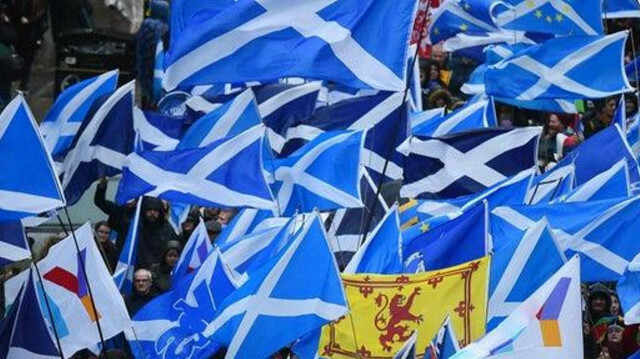
The independence from English has always been one of the main struggles for Scotland through the centuries.
The historic issue was depicted by Hollywood productions in various films, including the 1995 blockbuster Braveheart, directed, co-produced, and starred by Mel Gibson, in which he gave life to local hero William Wallace.
Wallace, who took the center stage in battles against the mighty English armies under King Edward I, otherwise known as the Hammer of Scots or Edward the Longshank, is a celebrated hero across Scotland.
The Scottish nation honored their hero with a colossal monument, The National Wallace Monument, which was built in 1869 on a hill overlooking the Stirling Bridge battlefield, where he led the Scottish army against the English army and won a decisive victory with his tactical genius in 1297.
His struggle to unite the Scottish clans around a nationalistic ideal and independence, alongside Scottish King Robert the Bruce, was vividly told in many books and other cultural works since his capture and execution in 1305 by Edward I.
But, his legacy, the ideal of independence has always remained vivid.
The Scottish national anthem, "The Flower of Scotland," sang widely in the country, remembers the victories against the English army in Stirling and Bannockburn.
Lyrics include standing against King Edward II’s army and sending him back home to “think again” -- a clear reference to Scots’ victory against English invaders in Bannockburn in 1314.
Scotland united with England under one crown in 1603, when Scottish King James VI inherited the English throne but the real unification of the two countries, which together make a big part of Great Britain, in 1707.
English and Scottish parliaments approved acts of union declaring a preferred marriage between the two countries due to economic and political reasons in 1706 and 1707, respectively.
Since then, the two countries have been two main parts of a united kingdom, England enjoying Scottish products such as oil and whiskey.
- Renewed bid for independence
The Scottish parliament in Holyrood decided to go for a referendum, and a public vote was held in 2014 with the approval of the central UK government.
Scottish people voted to remain as part of the UK in a 55% to 45% vote.
However, in the historic EU referendum in 2016, a 62% majority voted to remain as part of the bloc.
The local politicians and the leading Scottish National Party had insisted that the country would not be dragged out of the EU despite their will but to their despair, Scotland left the bloc with the rest of the UK in 2020.
Since the early days of Brexit talks between the UK and the EU, Scotland has insisted to be included in those talks and wanted to be heard, but the Scottish National Party (SNP) leader and Scotland’s First Minister Nicola Sturgeon has always accused Westminster of not listening to them enough.
- Pro-independence majority
As the Brexit deal with the EU had matured and later signed and ratified, Scottish voice of a second independence referendum (indyref2) and rejoining the EU has been heard more.
The new parliament formed after the May 6 election has a pro-independence majority although the SNP failed to reach the overall majority by winning 64 of the 129 seats in Holyrood. The Greens, who are staunch supporters of the independence won eight seats and the total of pro-independence MSPs are now 72.
In her victory speech, Nicola Sturgeon has pledged to press on with her plans to hold a new independence referendum.
She said a new independence is a matter for Scots and the central UK government’s attempts to block indyref2 would be undemocratic.
What will happen in the coming days in terms of the first fight against the coronavirus pandemic and then introducing a probable bill for a second referendum are still to be seen.
But, according to some political figures and citizens, a referendum cannot be blocked.
Speaking to Anadolu Agency on the election victory night, Scottish National Party Member of the Scottish Parliament for Edinburgh Pentlands constituency, Gordon MacDonald, said London’s blocking efforts on a referendum would be “dangerous.”
“If we are a democratic country and people voted overwhelmingly for parties that are pro-independence, then whose right for (…) any government to say ‘no, we are not allowing you’?”
“That’s a dangerous step to say (…) ‘no we are not recognizing your legitimacy’,” he said.
Andrew Wilson, an SNP supporter, said his country has been dragged out of the EU against their own will.
Also speaking to Anadolu Agency, Wilson said Brexit has had a great negative impact in Scotland, affecting industries and other aspects of life.
“Brexit was a material change in circumstances and that’s why we will get the second independence referendum,” he said, adding that if people in Scotland want to have a referendum, they will get it.
Wilson also argued that the international pressure on the central UK government would be significant if Scotland decides to go independent.
Jimmy, a barber in Edinburgh’s Westend, thinks if London blocks such a referendum, people might “take it to the streets” and protest.
He said that after the independence there might be trade negotiations with the EU.
“That’s what we need. We don’t want to be run by someone else after being independent,” he said.
A cafe owner near Edinburgh’s busy Haymarket station, Adam, thinks joining back the EU would be a good idea.
He said: “Obviously we are a small country and I think we need to be part of the EU.”













